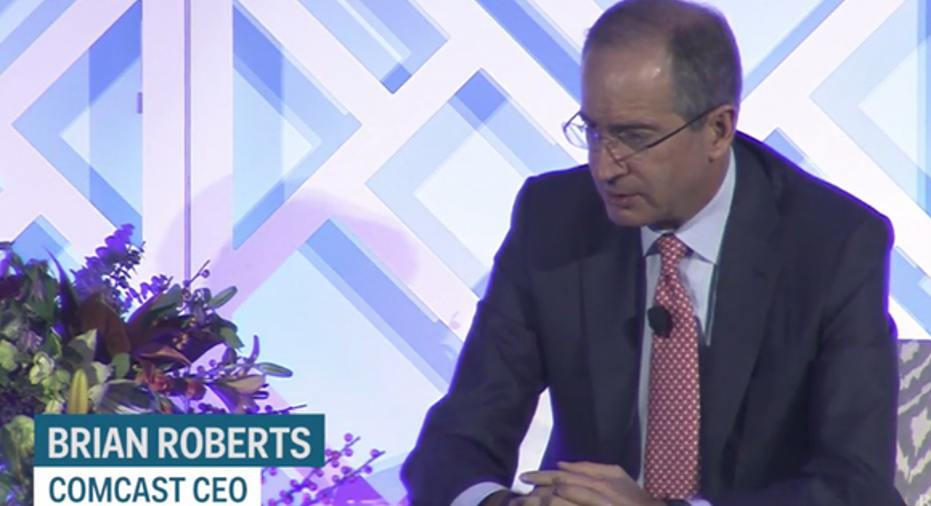Comcast's CEO Wants the End of Unlimited Data

In business there are some things better left unsaid.
The CEO of a candy company may hope that people choose to be less healthy and the leader of a factory which makes ammunition may wish for war, but most people in those positions are smart enough to not verbalize those thoughts.
It's similar to how I used to feel back in my days as the editor of small-town daily newspapers. A horrible death, major scandal, or any sort of traumatic event made for a better front page, which sold more papers. I wanted those things in the abstract -- they made my job easier -- but I was smart enough to not publicly wish for horrible things to happen.
WhatComcast CEO Brian Roberts said during an on-stage interview at Business Insider's Ignition conference falls into that category. In fact, what he did say may be more acceptable than what my fictional CEOs did not say and it's certainly more palatable than my unspoken wishes. Still. Roberts said something out loud that while it might be true, it could further poison the public against his company.
What did Roberts say?The CEO defended data caps and indirectly made it clear that he does not believe in unlimited Internet access.
"Just as with every other thing in your life, if you drive 100,000 miles or 1,000 miles you buy more gasoline. If you turn on the air conditioning to 60 vs. 72 you consume more electricity," Roberts said. "The same is true for [broadband] usage." Cellular data is already billed this way, "the more bits you use, the more you pay. So why not cable Internet, too?"
That's the same argumentAT&T andVerizonused to mostly eliminate unlimited plans for their wireless customers. Essentially, as Comcast has done, the two wireless providers let people pay for unlimited data right up until the point that having it meant something. In the cable world as it already happened in the wireless one, people are using more data which makes caps and overages very attractive to companies like Comcast.
Comcast's CEO defended data caps. Source: Business Insider
It's about semanticsRoberts also argued against the idea that Comcast has a data cap even though his company caps usage at 300GB per month, charging $10 for each 50GB used after.
"They're not a cap," Roberts said. "We don't want anybody to ever not want to stay connected on our network."
So, essentially the CEO is saying that it's not a cap because the overage charges are automatic meaning users won't lose access, they will just pay more.
It's not about todayAbout 8% of Comcast customers go over the 300GB allotment in markets where it's testing its caps which it prefers not be called caps according to ARS Technica. The point of the limit, which is an arbitrary one picked for business reasons, not technical ones, according to the technology news website, isn't so much to make money today, but to keep people from cutting the cord.
DISH Network'sSling TV CEO Roger Lynch called Comcast out for using caps and exemptions to those caps as a way to keep people from cutting the cord in an interview with CordCutting.com.
"If you look at cable companies like Comcast now instituting data caps that just happen to be at a level at or below what someone would use if they're watching TV on the Internet -- and at the same time launching their own streaming service that they say doesn't count against the data cap," he said.
300GB is plenty of data for people using streaming media as an add-on to traditional cable. For cord cutters it's a low number which adds to the cost of leaving Comcast's cable behind. The 300GB cap is about protecting revenue. Comcast will either keep people as cable subscribers or make them pay more for Internet. It's a smart strategy, but it's not one to crow about to the public.
Comcast is taking a riskWhile AT&T and Verizon are still the dominant wireless carriers both face legitimate threats to their business from T-Mobile, which does not charge overages, andSprint, which still offers low-priced unlimited plans. Comcast could face similar problems especially given the fact that major players includingAlphabet'sGoogle are rolling out ultra-high-speed Internet service without data caps.
Essentially Roberts is trying to put a system in place where customers have to either keep the status quo or pay more for Internet. That smacks a bit of evil genius, but there's nothing wrong with what he's doing. The mistake he's making is trying to publicly defend something that's inherently indefensible.
Comcast is not imposing caps because it has finite capacity or because increased data consumption is causing it to lose money. It's doing so in order to force people to keep cable or pay for the privilege of cutting the cord.
That's a strategy which could backfire in markets where people have a choice in Internet providers. Roberts should have learned a lesson that Batman villians taught us in the 1960s: If you feel the need to tell the hero your wicked plans before they get enacted, something will always happen to foil them.
The article Comcast's CEO Wants the End of Unlimited Data originally appeared on Fool.com.
Daniel Kline has no position in any stocks mentioned. He thinks data caps are more or less wrong. The Motley Fool owns shares of and recommends Alphabet (A shares) and Alphabet (C shares). The Motley Fool recommends Verizon Communications. Try any of our Foolish newsletter services free for 30 days. We Fools may not all hold the same opinions, but we all believe that considering a diverse range of insights makes us better investors. The Motley Fool has a disclosure policy.
Copyright 1995 - 2015 The Motley Fool, LLC. All rights reserved. The Motley Fool has a disclosure policy.



















